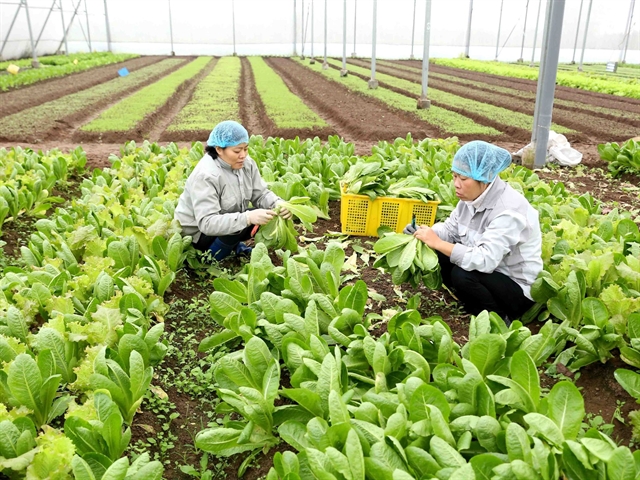 |
| The Thanh Hà Agricultural Production and Services Cooperative in Ninh Sở Commune in Thường Tín District grows microgreens and organic vegetables Photo courtesy of Hà Nôi’s Quality, Processing and Market Development Sub-department. |
HÀ NỘI — Hà Nội has made significant efforts to accelerate digital transformation in agriculture, aiming to enhance management efficiency and support producers and businesses in understanding market demand and diversifying product consumption channels.
Digital transformation not only helps Hà Nội’s farmers reduce production costs and eliminate intermediaries but also gradually shifts agriculture from traditional methods to a modern commodity agriculture system.
According to agricultural sector data, Hà Nội has developed 285 high-tech agricultural production models and digital transformation projects. High-tech agricultural products and digital transformation currently account for about 40 per cent of Hà Nội’s total agricultural production value.
The high-tech and digital transformation models have yielded economic benefits, especially in districts such as Mê Linh, Gia Lâm, Thường Tín, Đông Anh, Thanh Oai and Đan Phượng.
As one of the units producing vegetables according to VietGAP standards, the Thanh Hà Agricultural Production and Services Cooperative in Ninh Sở Commune in Thường Tín District, has focused on applying 4.0 technology to promote agricultural products.
Bùi Thị Thanh Hà, director of the Thanh Hà Agricultural Production and Services Cooperative, stated that the cooperative has an area of approximately 10,000 square metres for growing microgreens and safe vegetables. All products are produced according to organic standards, from seed selection and substrate sanitation, through to the irrigation system and vegetable care.
To facilitate product promotion and traceability, Hà said that the cooperative has applied information technology to register QR codes integrated with product traceability information such as production processes, harvesting and packaging. Consumers can simply scan the QR code on the product with a smartphone to access comprehensive product origin information.
Hoàng Văn Thám, Chairman and Director of the Chúc Sơn Clean Vegetables and Fruits Cooperative in Chúc Sơn Town, Chương Mỹ District, stated that the cooperative has implemented digital transformation in two areas: the application of the iMetos weather warning station and the eGap digital technology cluster on 17.8 hectares of vegetable and fruit cultivation.
The iMetos weather warning station helps manage and monitor production, adjust planting schedules and promptly modify vegetable care processes in response to weather changes. The eGap digital technology cluster allows the cooperative to electronically trace the origin of each vegetable plot and each farmer’s produce.
Building on this success, the cooperative continues to invest in perfecting a comprehensive digital transformation process in production and supply chain development. It also aims to connect with e-commerce platforms that confirm eGap quality on product labels, thereby gaining consumer trust.
Nguyễn Thị Thu Hằng, Director of the Hà Nội Sub-department of Quality, Processing and Market Development said: “Hà Nội’s agricultural sector is actively supporting cooperatives and businesses in developing the city’s Agricultural, Forestry, and Fishery Food Traceability System on the website check.hanoi.gov.vn.”
Currently, the system has granted management accounts to 3,430 entities, including cooperatives, production, processing, preliminary processing and packaging facilities, with 13,353 sets of product traceability codes meeting food safety criteria.
“Hà Nội is striving to accelerate digital transformation in agricultural production with the goal of modernising and enhancing the productivity and quality of its products. Food production and processing facilities in Hà Nội have already incorporated information technology into management processes, logistics, storage and supply chain promotion. This allows them to control the quality and origin of agricultural products from raw materials to market-ready items,” she said.
Additionally, producers are using e-commerce on social media platforms such as Facebook, Zalo and TikTok to connect directly with consumers, she added.
Nguyễn Mạnh Quyền, Vice Chairman of the Hà Nội People’s Committee, announced that Hà Nội has approved a budget of over VNĐ10 billion to support localities in acquiring machinery and equipment for digital transformation in agriculture.
Specifically, in 2024, this programme will be implemented in Sơn Tây Town and six districts of Thanh Oai, Ba Vì, Mê Linh, Sóc Sơn, Gia Lâm and Quốc Oai, with an estimated support fund of VNĐ3.65 trillion for 28 facilities.
In 2025, the programme will expand to Sơn Tây Town and the districts of Thạch Thất, Thanh Oai, Ba Vì, Mê Linh, Sóc Sơn, and Quốc Oai, supporting 49 facilities with a total budget of VNĐ6.55 trillion. — VNS
- Reduce Hair Loss with PURA D’OR Gold Label Shampoo
- Castor Oil Has Made a “Huge” Difference With Hair and Brow Growth
- Excessive hair loss in men: Signs of illness that cannot be subjective
- Dịch Vụ SEO Website ở Los Angeles, CA: đưa trang web doanh nghiệp bạn lên top Google
- Nails Salon Sierra Madre
 VnExpress News The News Gateway of Vietnam
VnExpress News The News Gateway of Vietnam





